Estimated reading time: 8 minutes
Homestead pets and livestock can become ill or injured at the most inconvenient times. Even before an SHTF scenario, you might not be able to get a vet to come save an animal in time. Learning how to handle minor or even life-threatening livestock emergencies could save not only your meat, egg, and milk producers, but the lives of your family who depend on them, as well.
All homesteaders should master basic livestock first aid and then strive to learn more advanced emergency animal care. Keeping a livestock first aid kit in your barn, home, and inside your farm vehicles could prevent the loss of a valuable food-producing or work animal.
In the case of a dire injury, like a predator attack or barb wire entanglement, you may have only minutes to prevent an animal from bleeding out or succumbing to shock.
In most states, it is legal to purchase a vast array of livestock medications, including antibiotics and vaccines, directly from an agricultural supply store like Tractor Supply, Rural King, or have them shipped directly to your door via Amazon.
Want to save this post for later? Click Here to Pin It on Pinterest!
20 Pet & Livestock First Aid Supplies to Stockpile
1. Scours Treatment
Scours is the term vets, farmers, and homesteading folks use when referencing diarrhea in livestock. While basically, any animal at any age can contract scours for a variety of reasons, it often tends to impact young animals (goats and calves in particular) the most.
Scours is often a symptom of colic. Humans can become ill if they come into contact with scours that stems from an animal sick with cryptosporidium the one known type of scours that can, and has, been contracted by humans. A human that contracts this type of scours often also gets diarrhea and intense stomach cramps.
The exact type of medication needed to treat scours will vary by both by the breed of livestock and the illness that caused diarrhea, but Scour-Ease and Ortho Equine Immediate Response Supplements are often used for this condition.
2. Bloat Treatment
Most types of medium and large livestock can contract bloat – ruminant animals like goats, sheep, and cattle. You can purchase Nutri-Drench poultry solution and stockpile other over-the-counter non-traditional medicine items to mix up your own drench in an emergency situation.
A commonly used homemade bloat mixture is comprised of three parts mineral oil and two parts baking soda. Usually, 1 quart of drenching fluid is given. You'll also need to purchase drenching tubing or use a calf bottle, or funnel and rubber tubing of some type to force the drenching fluid down the animal’s throat.
Related: 10 Common Livestock Mistakes to Avoid
You must administer the drenching fluid carefully, allowing the goat to swallow the liquid properly to ensure none of it goes into its lungs. Drenching an animal works best if you can stand it upright and very gently rub only the sides of the belly to help release the gas build up inside the stomach.
3. Vet Wrap
This is a livestock first aid kit must have. The easy on and easy off vet wrap can be applied quickly and used to cover a wound that has been bandaged to better adhere it to the animal – without pulling off fur or flesh when it is removed. Vet wrap can also be used to wrap muscle and tendon injuries to help stabilize them.
4. Antibacterial Solution
Keeping waterless antibacterial bottles and/or wipes in the pet and livestock first aid kit will allow you to quickly clean your own hands before or after handling an animal in distress. The solution or wipes can also be used to cleanse a wound on the animal if necessary.
Rubbing alcohol can also be used for this same purpose, but unlike wipes, it cannot help scrub dirt or bodily fluids from your hands or under your fingernails.
5. Livestock Needles and Syringes
Always keep and safely store a set of livestock needles and syringes in various dimensions so you can treat any animal on the survival homestead immediately.
6. Blue Kote
This livestock wound spray is superb for coating and protecting minor cuts and abrasions. Blue Kote also disinfects the wound and protects developing scrabs.
7. Penicillin
Durvet Penicillin Injectable is one of the most important and often used livestock medications you can purchase without a prescription for a homestead first aid kit. Had we not had livestock Penicillin on hand when our nanny goat Pearl was attacked by a dog, we would have lost her. The weather was bad, it was a holiday weekend, and the nearest Tractor Supply is 40 minutes away – and of course, the nearly deadly attack happened at night.
Related: 10 Predators to Beware Of On Your Homestead
8. Aspen Vet Ivermax
This livestock medication, also known as, Ivermectin Injectable 1%, is parasite injectable specifically for hogs and cattle. A single dose is often all it takes to save an animal from roundworms, gastrointestinal parasites, mange mites, lungworms, sucking lice, and grubs.
Although some preppers have been known to stockpile various livestock and fish medications to convert dosages on and use during a SHTF event, that should never, ever be attempted with Aspen Vet Ivermax. Also, cattle cannot be safely butchered for at least 35 days after being injected. Dairy cows of breeding age should not be administered the drug. Hogs should not be butchered for at least 18 days after receiving the medication.
9. Saline Solution
This saline solution can be used on humans or livestock to flush bodily fluids that come into contact with the eyes and to wash out debris from wounds.
10. Cornstarch
Like baking soda, the uses for cornstarch seem to be just about endless. It is especially helpful for sprinkling over minor wounds to keep them clean and deter flies from digging into them – preventing a protective scab from forming.
Related: Protect Your Livestock from Deadly Diseases
11. Iodine
This old-fashioned first aid kit item is still considered a potent disinfectant for minor wounds. Iodine can be used on even young animals and those close to reaching their butcher weight.
12. Measuring Tape
Keep a measuring tape in your barn first aid kit so you can record the dimensions of a growth, infection line, swollen body part, and girth on pregnant livestock.
13. Tea Tree Oil
This essential oil has been regarded as nature’s antibiotic for centuries. Tea Tree oil can be used to flush wounds to prevent or curtail infection, rubbed onto sore, torn, or infected gums, and used in healing fly sprays to keep insects and parasites from making your livestock their host.
The oil is highly concentrated, so a little bit definitely goes a very long way. Use sparingly on small dogs, cats, and poultry. A single drop should be sufficient to help heal a wound, using too much tea tree oil on small animals or infants could, in likely extended or extreme use, provoke a negative response in the nervous system.
I am not a doctor and not offering medical advice. I am merely sharing what I have learned from other homesteaders, through research, and what has consistently worked on my homestead over the years.
14. Honey
Use honey to help pull out infection, reduce swelling, and to heal minor wounds and burns. Honey can also help slow down blood flow when packed onto deeper wounds.
Related: 6 Ways to Protect Your Livestock From Predators
15. Quick Clotting Treatment
Keep some type of quick clotting gauze in the barn first aid kit – and a tourniquet would not be a bad idea either. The quick clotting pad can be used to immediately and rapidly stop massive blood flow and help keep the animal (or yourself after an accident on the homestead) from bleeding out until more advanced medical care can be offered or the injury treated.
16. Activated Charcoal
Use the activated charcoal to treat poisoning in livestock – or again, yourself when away from the home. This type of charcoal can be consumed (in proper dosages based upon body weight) to prevent a toxin from being absorbed into the bloodstream and gut.
17. Electrolytes
Keep a jug of homemade or store-bought electrolytes – or powder packets, in the livestock first aid kit to administer to sick livestock or animals that are injured and in danger of going into shock.
18. Sugar
You can use sugar (and salt to a lesser extent) to treat a prolapsed animal. Sprinkling or outright coating, exposed intestines can help shrink them before they burst so you can attempt to gently guide them back inside to prevent a long and painful death for an animal stricken with colic or a similar dire ailment.
Related: 5 Best Farm Animals To Raise On Your Homestead
19. Apple Cider Vinegar
Keep a large jug of apple cider vinegar in the barn or near the livestock first aid kit to use as a preventative treatment – although it can be used as a wound wash in a pinch. Mix 1 tablespoon of the vinegar per 1 gallon of water to help prevent or treat digestive tract issues and to give a boost to the animal’s immune system.
20. Miracle Salve
This last but definitely not least, livestock first aid tipwas handed down from my great-grandfather. Mix together 1 part turpentine and 3 parts petroleum jelly and put in the barn first aid kit, your first aid kit, in the bugout bag…basically make a lot of jars and keep them handy everywhere. Miracle salve stinks, but it promotes healing exponentially and keeps flies and other pests off of wounds and burns. It also makes a superb firestarter when slathered on some twigs.
In addition to these top 20 livestock first aid items, fill your kit with standard human emergency first responder tools as well. A rectal thermometer, scalpel, scissors, stethoscope, medical gloves, and even a snake bite kit, would all make the vital additions to the emergency kit as well.
Like this post? Don't Forget to Pin It on Pinterest!



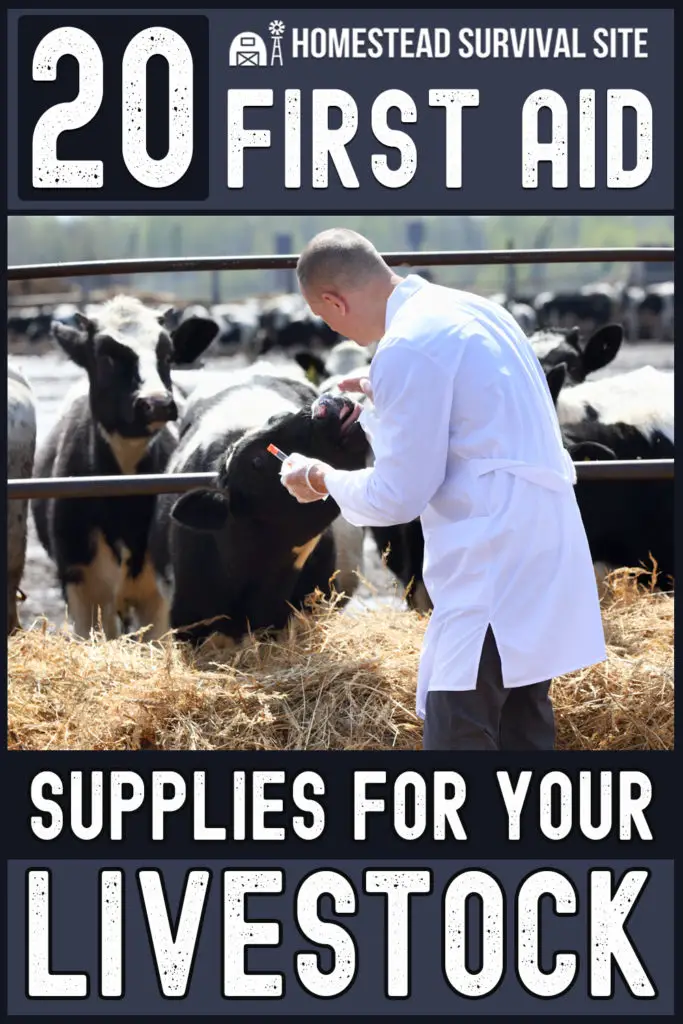

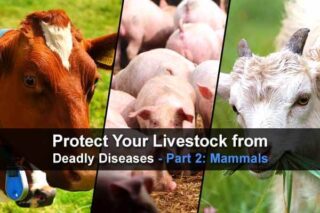

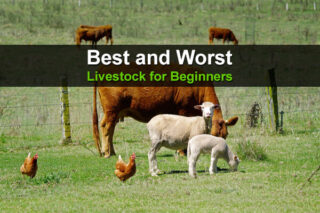
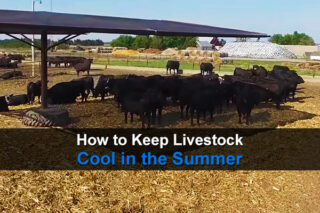

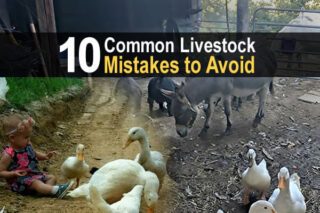

what kind of animals can you keep with goats